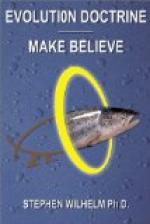Thus in merest outline the conception of the infinite personality works out its evolution. At all times, among primitive and higher religions, the powers are clothed with human forms, and gods are pictured as men endowed with intellects and passions, and motives of vengeance and benignity. Man cannot shape his postulated deities save in such forms, with the possible exception of the most philosophical concept of all, Brahma.
The second fundamental belief, namely, in immortality, owes its origin in greatest measure to the psychological processes described above. Another potent factor, however, has been the natural desire to continue existence hereafter, usually in order to reap rewards not bestowed here. This desire is implanted by nature through the operation of purely biological factors, and it has the value of an organic instinct. To specify more particularly, nature has placed every organic individual under the necessity of doing its utmost to prolong its own life in the interests of itself, of others of its tribe, and of its species. Extinction is not faced willingly by a human being endowed with full consciousness any more than it is passively tolerated by a lower animal which instinctively struggles with its foes until death. So the desire to continue alive—the “will to live”—is a natural instinct, which combines with the belief in persistent disembodied spirits and, no doubt, with many other elements, to develop the basic conception of some kind of an immortal existence.
The third element, human responsibility to the infinite personality, is variously recorded in lower and higher religions. Its conception grows partly out of the feelings of awe and terror inspired by great works of nature such as the thunder-storm, the cyclone, and the volcano, while the orderly and regular workings of even everyday nature seem to demonstrate the direct control of the powers who rule man as well. The savage sees his crops destroyed by a tempest or drought; he attributes the disaster to the particular powers concerned with such things whom he must have angered unwittingly, and whom he must propitiate by sacrifice or penitence. His individual and tribal acts do not always accomplish the desired ends, and again the laws of infinite and ultimate powers must have been contravened, as he interprets the situation. Therefore his whole religious consciousness was exerted in the direction of finding out what was the ultimate constitution of nature, with which human activities must harmonize if they are to be successful. Bound by custom and convention and biological law, he looks about wonderingly to find the external authority for his bonds. To his mind this authority must be the host of spirits and gods who had made him and the things of his world. It is in this way that so many ethical elements have found places in religious doctrines, to be viewed as absolute rules of conduct coming from outside of nature, and not from nature itself, in the way the earlier sections of this chapter have shown.




